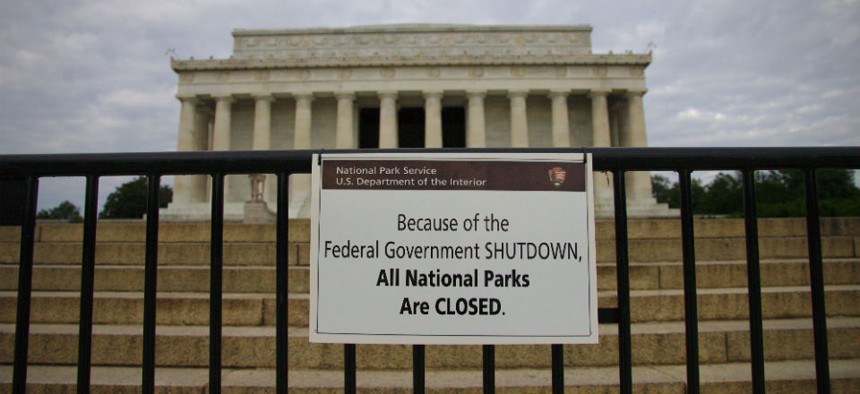
Flickr user Rich Renomeron
Bill to Avoid Shutdown on Track for Passage This Week
Measure would allow 1 percent pay raise for federal employees.
A spending bill to keep government agencies open appears poised to clear Congress this week, though the final iteration of the measure remains unclear.
Lawmakers in the House debated the continuing resolution, which would fund agencies and avoid a government shutdown until Dec. 11, at length on Tuesday, with members of both parties agreeing the stopgap measure was poor practice but unfortunately necessary. The legislators took considerable time -- an unusual six hours -- to debate President Obama’s request to authorize further military strikes and opposition training and arming to “degrade and destroy” the radical Islamist group ISIS.
House leadership anticipated a vote on both the military request, which is being offered as an amendment to the spending bill by House Armed Services Committee Chairman Buck McKeon, R-Calif., and the CR itself on Wednesday. The Senate would then vote on the measure on Thursday before it leaves Washington, D.C., in advance of the upcoming November election.
House Republicans said on Tuesday passage of Obama’s military request would require the support of at least some Democrats, many of whom have expressed reservations about authorizing airstrikes and more Americans on the ground in Iraq. The underlying shutdown averting bill has encountered little resistance, however.
“We should not and cannot continue to fall back on short-term spending bills like this one,” said House Appropriations Committee Chairman Hal Rogers, R-Ky., author of the $1.01 trillion bill, on the House floor Tuesday. He added the lack of regular order in appropriations causes “uncertainty within our federal agencies and economy,” but that “at this time though, the best way to avoid serious damage to this country is to pass this continuing resolution.”
So far the House has passed seven of the 12 spending bills necessary to issue line-by-line appropriations at each agency, while the Senate has passed none. Rogers blamed Senate Democrats for necessitating the stopgap measure.
The stopgap bill is mum on Obama’s request to grant federal employees a 1 percent, across-the-board raise in 2015, effectively allowing the pay bump to go through. Congress would aim to pass an omnibus appropriations bill after the midterms. Lawmakers could theoretically block the pay raise at that time, though they have yet to show any interest in doing so.
If passed, the CR would extend the charter of the Export-Import Bank -- set to expire Sept. 30 -- through June 2015. While Bank officials said they would not have been forced to shut their doors come Oct. 1 in the absence of congressional action, the agency’s 400 employees would have been out of a job when its portfolio reached maturity.
The CR also includes a boost in funding for the Veterans Affairs Department to investigate potential impropriety in manipulating waitlist data and retaliating against whistleblowers. It would increase appropriations for VA to reduce its disability claims backlog and allow Customs and Border Protection the flexibility to move funds around so it can maintain its current workforce levels.
The measure avoids more controversial provisions, such as addressing the U.S. Postal Service’s plan to close 82 facilities nationwide in 2015. A majority of senators and 160 House representatives wrote to their respective appropriations committees asking that any spending bill delay closures for one year.
(Image via Flickr user Rich Renomeron)







